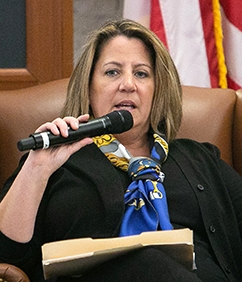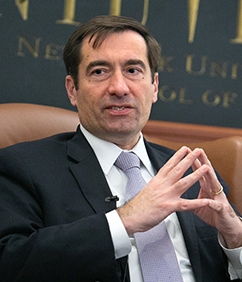Justice Department veterans Lisa Monaco and John Demers discuss the evolving US approach to national security
At a Latham & Watkins Forum on November 13 co-hosted by NYU Law’s Reiss Center on Law and Security, Assistant Attorney General for National Security John Demers engaged with NYU Law Distinguished Senior Fellow Lisa Monaco in an expansive dialogue about the evolution of national security law in the years since 9/11. Monaco had served in Demers’s current position before she became President Obama’s homeland security and counterterrorism advisor in 2013.
The two experts touched on topics such as a change in focus by the Justice Department’s National Security Division, from combating terrorist organizations to fending off threats from nation-states. “When I served as the assistant attorney general for national security from 2011 to 2013…our top three priorities were terrorism,…nation-state-enabled cyberthreats,…and then, broadly, foreign intelligence threats,” said Monaco. “So this shift that John described is really quite remarkable.”
Monaco and Demers also discussed the political friction that can result from certain prosecutions, the long-delayed trial of the five men accused of plotting the 9/11 attacks, recent unprecedented public revelations about FISA applications, collaboration with the intelligence community, the controversial withdrawal of US troops from Syria, and new concerns about domestic terrorism.
Select remarks from the conversation:
John Demers:
“[With] the homegrown violent extremist, the really hard thing is distinguishing, if you’re the agent, between the person in their basement who’s just going to look at beheading videos all day long, and just keep looking at them, and the person who’s going to look at beheading videos, and Flames of War videos, and is going to ultimately go do an attack that is very low-level—meaning [it] doesn't take a lot of planning, doesn't take a lot of purchasing, so it’s hard to detect when that person’s going to shift their focus.” [11:08-11:35]
“You’re not blind to the fact that your cases can have an impact on the broader relationship between the countries, so it is important that we talk to the State Department—not early in the investigation, but when you’re about to bring charges that are going to implicate the foreign policy of the United States. You do need to give folks a heads-up—Treasury, State, depending on what the matter is—and talk through with them what their equities are while maintaining your independence to decide when and whether you’re going to bring this charge. I mean, there’s no magic formula to this. It just takes a lot of thinking through the potential issues, and then standing firm. The importance of it is I don’t want anybody to think that…the department has brought a case because of anything other than the law enforcement reasons that we brought the case.” [32:37-33:55]
Watch the full video of the event (1 hr, 9 min):
Posted January 22, 2020



